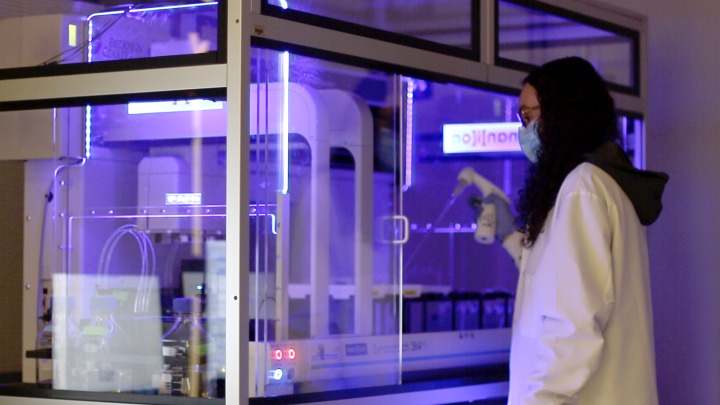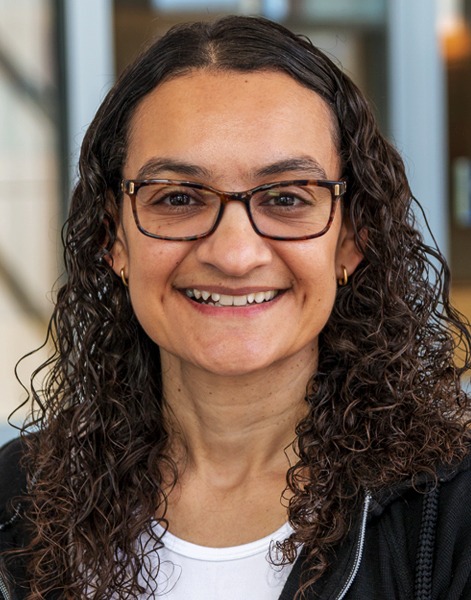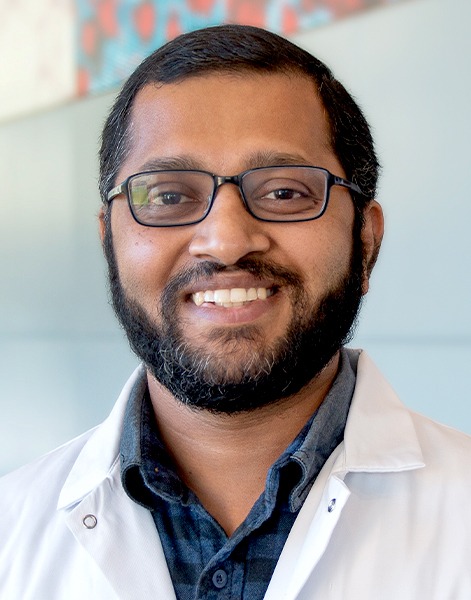
Philanthropic support funds two LSI research projects with the potential to impact human health
Two new high-risk, high-reward research projects are moving forward at the U-M Life Sciences Institute, with support from philanthropic funds established specifically to promote such research.

Building Better Obesity Therapies
Assistant research scientist Ciria Hernandez, M.D., Ph.D., will use the funding to test the activity of hundreds of compounds against a protein that plays a crucial role in metabolism. From its position in the brain, the melanocortin 4 receptor (or MC4R) helps to regulate the balance of energy throughout the body — and deregulation of the MC4R is the most common cause of genetic obesity.
Most drugs in development for treating obesity fail in clinical trials because they are associated with cardiovascular side effects, such as elevated blood pressure, Hernandez says. She is investigating an alternative pathway to design more effective MC4R therapeutics that she believes will bypass these side effects.
Hernandez will use high-throughput screening — a process that enables researchers to rapidly test many different compounds — to identify molecules that could be further developed into potential therapeutics for the treatment of metabolic syndromes.
“High-throughput screening campaigns are beyond the realm of funding for traditional funding agencies such as the National Institutes of Health. They are deemed risky and costly,” Hernandez explains. “With the aid of this funding, I am confident that our efforts will lead to the discovery of a new class of drugs not previously considered for pharmacological therapies in obesity and cachexia.”

Targeting transporter proteins
Just a few floors below Hernandez, research investigator Vikas Navratna, Ph.D., is seeking intra-cellular therapeutic targets for diseases ranging from metabolic disorders to cancer.
Navratna studies intra-cellular membrane enclosed compartments called lysosomes. These organelles were long considered to be the cells’ ‘scrap metal yard,’ he says, where the unnecessary components of the cell are degraded and recycled. But research over the past two decades has consistently demonstrated that lysosomes play much more important role both in human health and, when misfunctioning, in many types of diseases.
Using biochemical and structural biology techniques, Navratna will investigate lysosomal membrane transport proteins, which sit on the surface of lysosomes and move essential biomolecules into and out of the lysosome, regulating biomolecular homeostasis within the cell.
“Molecular mechanisms of lysosomal transmembrane proteins are, in general, still very poorly understood,” Navratna says. “Before we can begin thinking about targeting these proteins to treat disease, we need a much better understanding of their structure and function — and that’s what we hope to gain with this research.”
With this new funding, Navratna will perform preliminary analyses on multiple lysosomal transmembrane proteins, with the goal of identifying suitable candidates for further development as potential drug targets against metabolic disorders, cardiovascular diseases and cancer.
The projects were selected from applications for the Klatskin-Sutker Discovery Fund award. This annual award was established by a gift from the Klatskin and Sutker families to encourage innovative, early-stage research that has potential to have a positive impact on human health.
The high quality of this year’s applications resulted in the committee’s selection of two projects to fund. Navratna will receive the Klatskin-Sutker award, and Hernandez will receive funding from a bequest to the LSI from U-M alumna Rita L. Willis.
“The quality and creativity of this years’ applications demonstrates the power of fundamental discovery research to ultimately impact human health,” says Deborah Klatskin.
“Successful translational medicine is built on this type of science, and we are thrilled to be able to support projects like these,” adds Burton Sutker, M.D., who also serves on the LSI Leadership Council.


